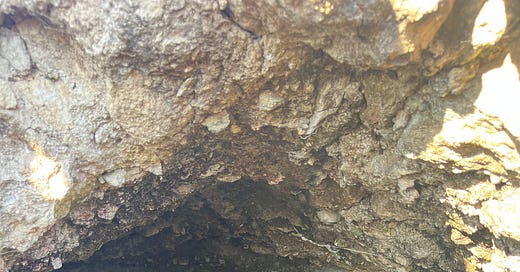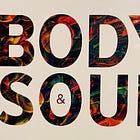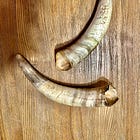Here Lies a Healthy Body
Want to live well today? Take a close look at death.
Dear Healthy Jew,
This post talks about death. Although, as we’ll learn, awareness of death is part of living well, if you’re dealing with depression, now might not be the time. Talk to a competent and qualified professional before reading on.
On a recent walk over a hill outside of Bet Shemesh (next to Milk Thistle Hill), I came across this looted burial cave full of human bones. (See that square crypt on the far end?)
Is Healthy Life Only in the Body?
The grisly scene reminded me of a story:
Once there was a fellow who lived life for perfect health. He always ate only Real Food, was a true-blue Walker, and used every tool in the book to Solve Stress.
So healthy he was, that he never got sick. Until, one day, at the ripe old age of 111, he died.
He asked that his tombstone be engraved with the following simple inscription:
Here Lies a Healthy Body
Today, his body is long gone, his soul high in heaven. But their was a time when he em-bodied healthy living like no-body else.
The moral of the story? Even the healthiest body is doomed to death. No matter how wholesome, happy, and pleasurable our earthly existence, one day it all will come to an end. At best, our rotting corpses will be remembered by other future-corpses as having once been strong as oxen.
What value can be found in life heading toward such a dubious destination? What purpose can there be in toiling to keep our bodies healthy for mere moments on the vast scale of time?
Obviously, having a healthy body can’t be the final purpose of healthy living. And yet, as I explained here recently, living healthfully is where all good choices begin. We need to live well right here on earth, in this mortal body that today our souls calls home, because guiding our actions for the purpose of health transforms us from thoughtless animals to genuine human beings.
But life doesn’t end with the good choice of taking care of ourselves. If that’s all we’ve got, then, in Maimonides’ words, “that too isn’t a good way”1. Just as they chase pleasure and prestige, so too we chase health to get more refined sort pleasure and prestige. But we’re all still lost inside our-“selves”, every new minute coming closer to that pile of bones in the cave.
True purposefulness begins with choosing physical health - and then reaches past it, extending the purpose of wellness into a means to know and emulate God.
Die Before You Die
Our grim end does’t only force us to look beyond the body. Ironically, living in awareness of death is one of the best ways to wake up to body-life.
How? One day life on earth will end for us. That day might be today. If so, there won’t be any other day to do better then. And there’s no need to worry what will happen tomorrow. All we have - all we need - is right here and now.
As my teacher, of blessed memory, told me:
Life is only the tiniest moment. If we’re lucky, we’ll get many tiny moments strung together.
Or as the Talmud (Yevamos 63b) put it:
Don’t worry over tomorrow’s troubles, because you don’t know what will happen today. Maybe tomorrow will come and you will no longer be; you were worried over a world that isn’t yours.
Therefore, if the goal of life is to find pleasure and prestige, we better run get it all now. But for most people, certainly readers of Healthy Jew, such things are means to a greater ends. When we’re awake to ourselves, we live for values that outlive our bodies: kindness, love, friendship, honesty, humility, knowing and emulating God.
Unfortunately, the noise of life often puts our minds and hearts to sleep. Lost in actions - the good ones! - we forget the point of it all.
Paying attention to death can shake us out of our reverie. “Wake up! Who are you?” Our sovereign bodies won’t last much longer. Are they all we are?
If we want to become something more than the protein and fat destined for some subterrain creature’s supper, we’d better let go of the distractions and focus on what really matters. Today, because tomorrow might be too late.
As the Midrash, quoted by Rabbi Yonah of Gerundi’s (d. 1264) in his classic Gates of Repentance, suggests (2:6):
You don’t want to die? Then die before you die.
When I found the cave full bones, right next to the ruins of an ancient village, I couldn’t help but observe the contrast with the teeming plant life all around them.
The people that lived there are long gone. Yet the plants they ate cycle on through life and death. In truth, the people too cycle on through life and death - through us. So foraging in Natural Israel is a wonderful way to connect with the profound messages of death and life - past and present, people and plants.
When I returned with Nesanel Eisenmann, the renowned local tour guide, to cover the cave’s mouth (more on that soon), these were my thoughts when he asked me to describe what we looking at:
Wonderfully Concentrating the Mind
I think about a lot about death.
When I’m not writing about healthy Jewish living, I’m sometimes writing about the other side of the same coin: Judaism’s death penalties. (In fact, that’s the subject of one of the serialized deep-dives I’m preparing for paid subscribers to Healthy Jew!)
In one of my favorite books topic, The Death Penalty: An American History, Stuart Banner (pp. 16-17) suggests that an historical objective of the death penalty was facilitating repentance: a dying man has nothing to lose by admitting his wrongs. This was particularly important for hardened criminals who wouldn’t wake up by themselves.
As Samuel Johnson, the noted 18th century English writer, commented:
When a man knows he is to be hanged in a fortnight, it concentrates his mind wonderfully.
The message isn’t only for capital criminals. Anyone liable to die soon – that is, all of us – can concentrate their minds wonderfully by facing death. (As I’ll explain, this universal message is one of the primary educational objectives of the death penalty.)
The Day Before You Die
The great Mishnaic sage, Rabbi Eliezer, taught his students:
Return [to God] the day before you die.
No fools, they asked their teacher:
How does a person know which day he will die?
To which their Rabbi Eliezer replied:
That’s the point! Return today, because perhaps tomorrow you will die. If you live that way, all your days will be in repentance.
So when’s the time to return to God - to our true selves? Right before dying. Which means every day. Live in awareness of death, taught Rabbi Eliezer, and your mind will always be wonderfully concentrated.
Yet it’s uncomfortable to march through life always thinking of death. Leaving life on earth is so far beyond our comfort zones.
But death can’t wonderfully concentrate our minds if we conveniently forget about it.
God gets that. So He decided to help us out. At the end of every year, He ends our life. Then, if He wishes, on the holiday of Rosh Hashanah, He gives us another year to live. In this way, God invites us every year to look closely at death and life. As we learned last week from Maimonides, the shofar calls to his’orrerus, which means waking up to reality.
The shofar awakens us to a valuable life that comes only from facing death. That was the story of the original shofar: the ram’s horn caught in a bush next to to the altar on which Isaac lay bound, prepared for being offered as a sacrifice. But Isaac wasn’t meant to die - just as our awareness of death isn’t in order to die. The exact opposite: by coming inches away from death, Isaac touched life at its most precious. Every year on Rosh Hashanah we can hearken to the call of his legacy.
Burying the Bones
What happened with the bones in the cave?
A friend suggested I contact the local burial society so they could reinter the bones in a proper grave. I didn’t have the patience to pull them up the hill, so I went back myself with a friend, the renowned local tour guide, Nesanel Eisenman, to close up the mouth of the cave.
This is what it looked like when we were finished:
May you rest in peace. Whoever you were - and are - thank you for showing me death. It’s helping me live well today.
One Suggestion: Find a comfortable surface to lie down, preferably straight on your back. If possible, the floor is best. Put your arms along your body, close your eyes, relax your muscles, and lie motionless - as if you were dead.
But keep breathing. When you breathe out, notice the breath of life leaving you, if only for a moment. Die to everything in the past and future: worries, hopes, expectations, resentments, fantasies, memories. When you breathe in, be aware of the new gift of life entering your body, for one moment. Repeat the cycle, again and again.
(You might find it helpful to set a timer so you don’t need to worry when to stop - which could take your attention away from death and life.)
Thank you for reading Healthy Jew.
Here are 2 great paths to continue the journey:
Also check out this intro and index to explore hundreds of posts about our 3 Healthy Jew topics: Wellness with Wisdom, Land of Life (Israel), and Sensible Spirituality.
Finally, always feel free to reach out here with any comments, questions, or complaints:
I look forward to hearing from you!
Be well,
Rabbi Shmuel Chaim Naiman
Introduction to Avos Chapter 5. See also Laws of Character 3











